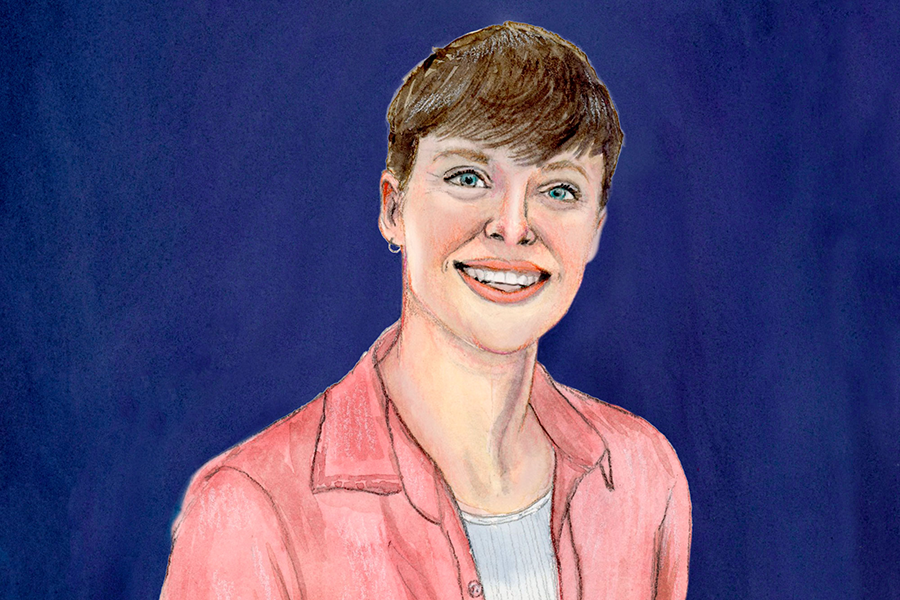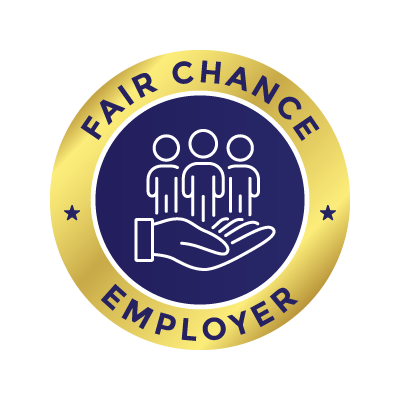Morgan grew up in Gresham, Oregon, a suburb just outside of Portland. From the outside, her family looked like any other. But behind closed doors, Morgan was raised in secrecy. Her two moms kept their relationship hidden because, at the time, to come out as gay in the military would cost someone their career. One of Morgan’s moms served in the Air Force before “Don’t Ask, Don’t Tell,” a time when simply being suspected of being gay could lead to harassment or dishonorable discharge.
“I remember slipping up and calling Renae ‘Mom’ in front of someone, then immediately panicking, thinking I got my mom kicked out of the military,” Morgan shared. That fear followed her throughout childhood, shaping a life of silence and shame.
She learned to hide parts of herself to survive. “I learned there was something wrong with me. I learned to live a double life.”
As a young girl, Morgan was bullied at school for having two moms and for the way she dressed. Her community wasn’t as progressive as Portland’s reputation today might suggest. At home, things weren’t easier. One of her moms was violent, and Morgan often felt unsafe. There was no space to talk about how she was feeling, and no one to guide her through the chaos. “I don’t remember anyone ever asking me how I felt,” she said.
Morgan found refuge online, discovering other kids like her in forums and chatrooms. The internet became her lifeline. “It saved me,” Morgan said. “I knew I wasn’t broken.”
But the pressure of hiding, the bullying, and the violence at home eventually took a toll. At 12 years old, Morgan attempted suicide. “What I wanted was oblivion; to make it all go away.”

Morgan’s Pathway to the Justice System
Morgan’s desire to escape would follow her into young adulthood. Due to one’s gambling addiction and the other’s abuse, her parents separated. She gladly stayed behind with her biological mom. At 17, facing housing instability, Morgan dropped out of high school and went to work at McDonald’s for $7.25 per hour. With no long-term vision, she began using drugs to cope with the situation. OxyContin use turned to heroin, because it was cheaper and easier to find once the government cracked down on prescription opioids.
Morgan overdosed the first time she tried heroin. She woke up surrounded by paramedics. Her boyfriend was arrested. They lost their home. But instead of scaring her straight, the experience reinforced the hopelessness she already felt.
Over the next few years, Morgan cycled in and out of detox and rehab programs. She tried to keep one foot in “polite society.” She worked as a pizza delivery driver. She went to school. She even got her EMT license and started paramedic training. But addiction doesn’t care how smart or hardworking you are. It crept in slowly, taking over more of her life.
“I thought I was too smart to let it happen to me,” Morgan says, “but I eventually learned that addiction knows no bounds.”
By 23, Morgan was arrested and charged with felony drug possession. She entered drug court, hoping to avoid a conviction. But instead of getting help, she found herself punished. She was jailed for testing positive, fired from her job for missing work, and forced to drop out of school. Then, just before Christmas, she discovered her mom dead of an accidental prescription overdose. The loss devastated her.
One day, Justin, a close friend since high school, called and asked if Morgan could help him get a gram of heroin. Morgan agreed, arranging the sale through a roommate. Tragically, the next morning, Justin was gone; he had died of an overdose. Justin had been like family to Morgan. They had gone to the same high school and shared years of memories. They understood each other in a way that only people with shared struggles can. That night, a SWAT team raided her home, and Morgan was arrested and charged with a federal crime for delivering a drug that resulted in death. “He was my best friend,” she said. “We were just trying to survive.” Morgan was looking at a lot of prison time, but Justin’s Mother asked for leniency. She told the court that her son died of his own choices, but mostly, of a broken heart. Morgan was sentenced to five years.
Incarceration
Morgan’s time in federal prison was not what most people might imagine. She wasn’t sent to a minimum-security camp. Instead, she served her sentence at Dublin Federal Correctional Institution in California, a medium-security prison with limited programs. Despite these challenges, Morgan made the most of her time inside. She immersed herself in language study and thanks to the many women from Mexico incarcerated alongside her, learned to speak fluent Spanish.
Morgan’s relationships with the other women in prison opened her eyes to broader systems of injustice. She observed how many of the women “were far from home, locked up, and forgotten.” Inspired by her new community, Morgan began to see how mass incarceration was not only a domestic crisis, but a human rights issue. She wrote about her experiences, and one of her stories was published by Vice, where she reflects on how learning Spanish changed her perspective and deepened her empathy.
In January 2018, Morgan was released to a federal halfway house. Her reentry was swift and focused. Within days, she enrolled at Portland State University, determined to rebuild her life through education. She double-majored in Public Health and Spanish, with a minor in Latin American Studies. Despite being on house arrest and later on federal supervision, she excelled academically. She graduated from the University Honor’s College summa cum laude in 2021.
While still on supervision, Morgan received the Gilman Scholarship and studied abroad in Argentina and Uruguay. She also traveled to Peru and Brazil and completed a competitive internship at the International Network of Civil Liberties Organizations (INCLO) in Argentina, where she worked as a translator. Even with travel restrictions and regular drug testing, Morgan used every opportunity to learn, contribute, and push the boundaries of what was expected from someone with a criminal record.
Morgan’s Current Impact
Morgan’s lived experience fuels her advocacy today. She is one of 21 people in Oregon who has been appointed to the Measure 110 Oversight and Accountability Council, where she helps guide the state’s effort to shift from criminalizing addiction to treating it as a public health issue. She also served on Oregon’s Alcohol and Drug Policy Commission, where she helped shape statewide approaches to substance use prevention and recovery. She now works as a researcher at UCLA’s Drug Checking Los Angeles.
Through these roles, Morgan works to ensure that others receive the kind of support she was denied. During her years of substance use, Morgan was repeatedly jailed and cycled through ineffective treatments without ever being offered medication-assisted treatment, the gold standard for opioid use disorder. She now uses her platform to educate the public and policymakers about evidence-based care, harm reduction, and the importance of treating substance use with compassion, not punishment.
But even with all her achievements, Morgan continues to face barriers that stem from her criminal records. Despite her degrees, public service, and published research, she has still struggled at times to find an apartment, faced restrictions with certain employers, has been rejected from delivering food for apps like Grubhub, and this year was denied entrance to the United Kingdom, missing a conference where her research was presented. She applied for a presidential pardon in 2024; technically, it is still pending, but in practice, it is unlikely.
“Even though my sentence ended years ago,” Morgan says, “my punishment continues.”
Morgan speaks openly about the long shadow cast by a criminal record. She knows she’s one of the lucky ones: someone who survived substance use disorder, incarceration, and reentry. However, she refuses to let her story be the exception. Instead, Morgan sees it as a roadmap for what’s possible when people are given real chances to heal, grow, and contribute.
“Heroin was always just slightly more convenient than suicide,” Morgan said. “But once I got that second chance, I made it count. And I’ll spend the rest of my life making sure others get one too.”
What are you waiting for?
It’s time to leave the past behind. Use our tool to quickly check if you have records that are eligible for expungement today!
Find out if you’re eligible in under 3 minutes.
This story is part of our #1in3 campaign, a project to end the stigma and raise awareness of how common it is to have a criminal record.
1 in 3 Americans has a criminal record, which is a lot more common than people think. No one expects to be involved in the justice system, but it can happen to anyone. People of all ages, backgrounds, genders, and income-levels are involved in the justice system. Their pathways vary, but the barriers of a record affect them all. Our hope is that by sharing their portraits and telling their stories, we can change the way people think about people with records and appreciate them for all they have overcome.




